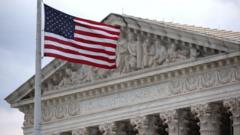The state of Oklahoma is facing a pivotal moment as the US Supreme Court, through an equally divided vote, has prevented public funding from being allocated to a controversial charter school plan backed by the Catholic Archdiocese. The court's decision, announced on Thursday, reflects a split among justices and affirms a prior ruling from the Oklahoma State Supreme Court which deemed the school’s establishment unconstitutional.
The charter school in question, designated St. Isidore of Seville Virtual Catholic Charter School, would have received approximately $23.3 million in public funding over five years. It aimed to serve around 500 students from kindergarten to high school, combining standard education with religious teachings. However, the move faced legal pushback when Oklahoma Attorney General Gentner Drummond filed a lawsuit arguing that the proposal infringed upon constitutional principles separating church and state.
In its ruling, the Supreme Court refrained from issuing a formal opinion, indicating only that the judgment was upheld by an evenly divided court. The absence of a clear ruling left the door open for potential future disputes on similar issues. Justice Amy Coney Barrett, a conservative member of the court, opted not to participate in the decision without disclosing her reasons.
The ruling has elicited strong reactions from both sides of the debate surrounding religious freedom in education. Drummond, voicing his approval, emphasized that the decision preserves taxpayer rights and prevents government funding from supporting radical religious schools. Conversely, the Catholic Archdiocese expressed disappointment, asserting their commitment to educational choice and equal opportunities for all families.
The Oklahoma case forms a crucial chapter in the ongoing dialogue over educational funding and religious institutions, setting a precedent that may influence similar discussions nationwide. As the debate continues, it appears that the conversation around school choice, charter schools, and the intersection of religion and education will remain in the spotlight for years to come.
The charter school in question, designated St. Isidore of Seville Virtual Catholic Charter School, would have received approximately $23.3 million in public funding over five years. It aimed to serve around 500 students from kindergarten to high school, combining standard education with religious teachings. However, the move faced legal pushback when Oklahoma Attorney General Gentner Drummond filed a lawsuit arguing that the proposal infringed upon constitutional principles separating church and state.
In its ruling, the Supreme Court refrained from issuing a formal opinion, indicating only that the judgment was upheld by an evenly divided court. The absence of a clear ruling left the door open for potential future disputes on similar issues. Justice Amy Coney Barrett, a conservative member of the court, opted not to participate in the decision without disclosing her reasons.
The ruling has elicited strong reactions from both sides of the debate surrounding religious freedom in education. Drummond, voicing his approval, emphasized that the decision preserves taxpayer rights and prevents government funding from supporting radical religious schools. Conversely, the Catholic Archdiocese expressed disappointment, asserting their commitment to educational choice and equal opportunities for all families.
The Oklahoma case forms a crucial chapter in the ongoing dialogue over educational funding and religious institutions, setting a precedent that may influence similar discussions nationwide. As the debate continues, it appears that the conversation around school choice, charter schools, and the intersection of religion and education will remain in the spotlight for years to come.


















